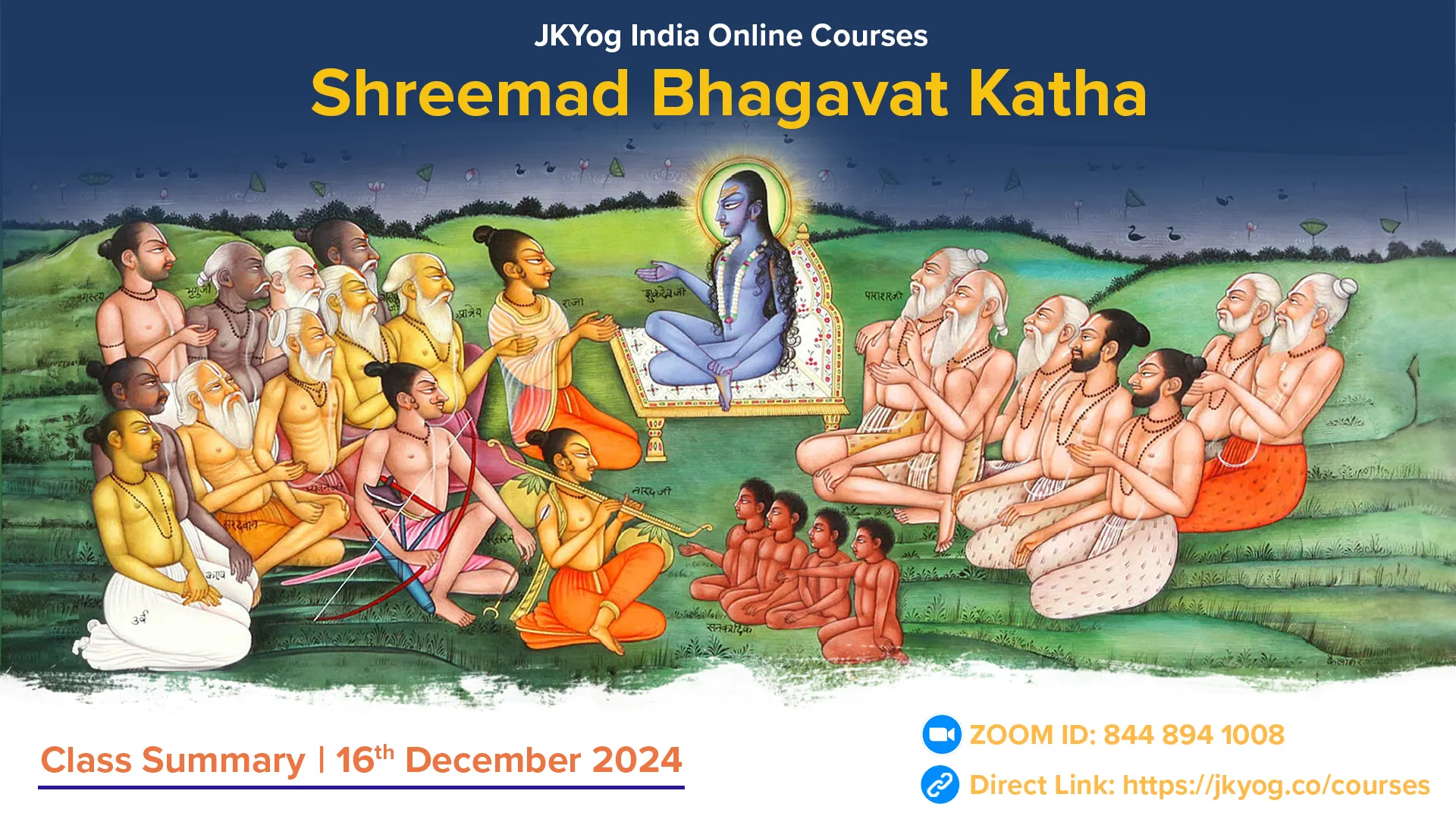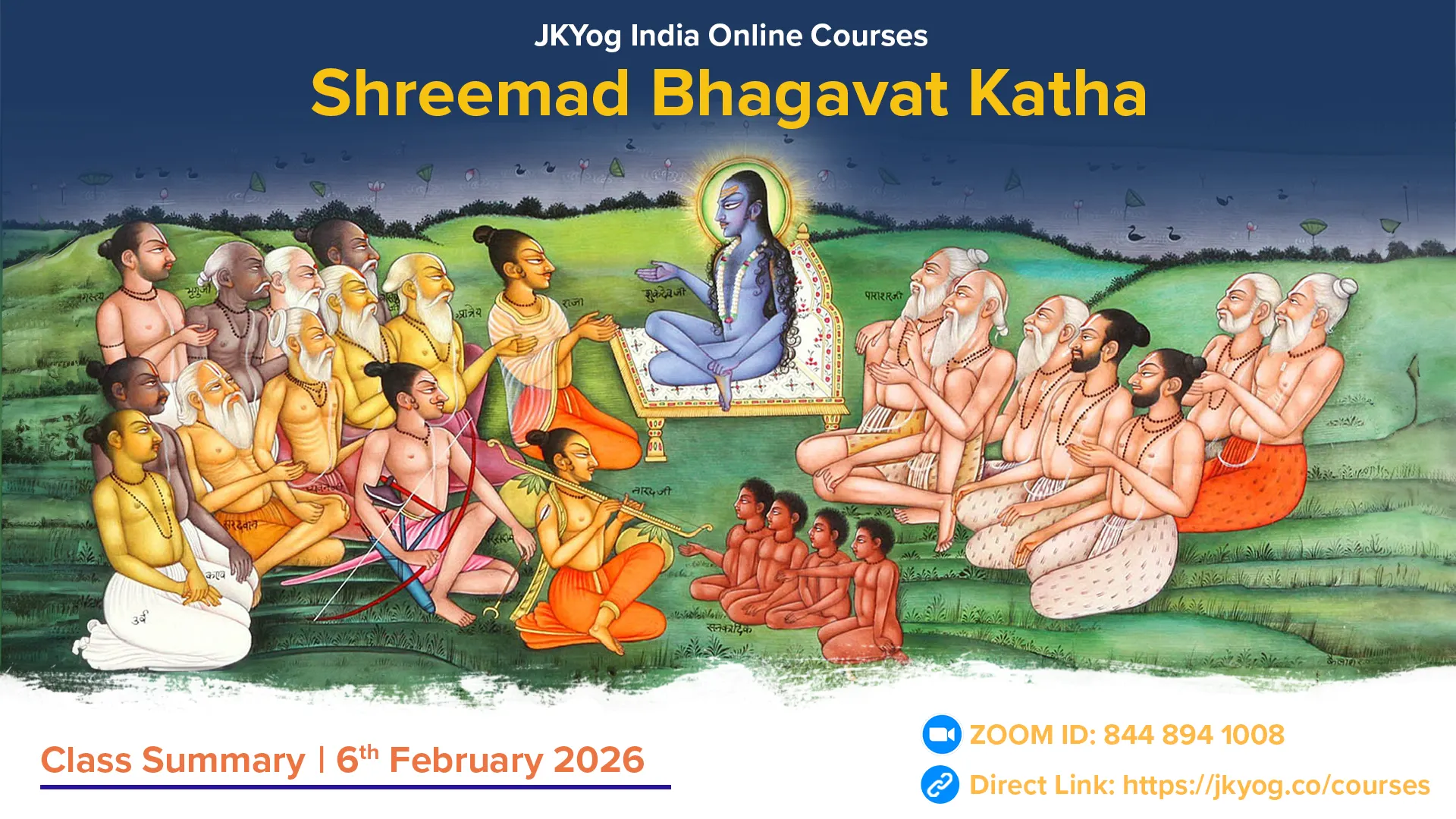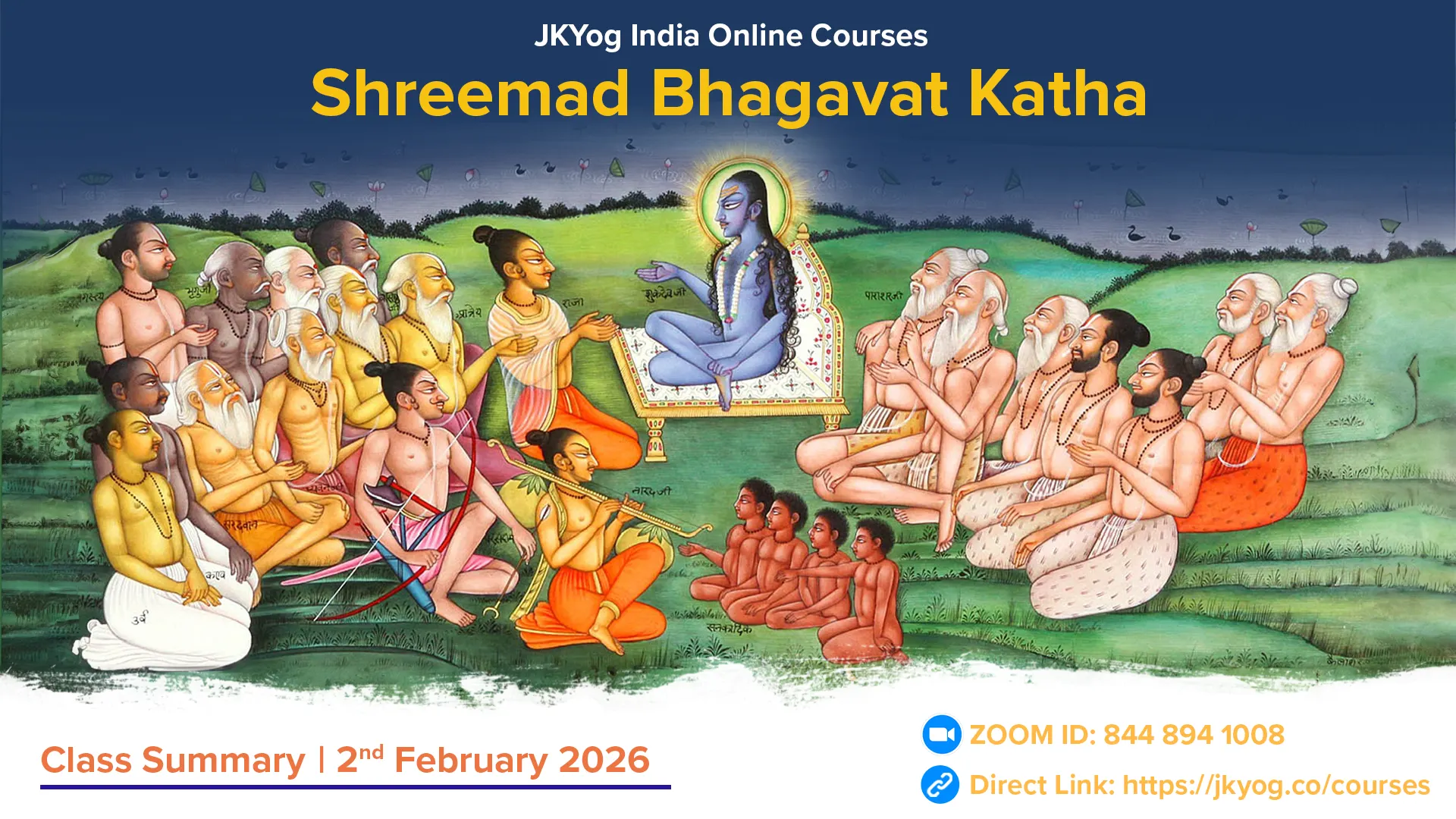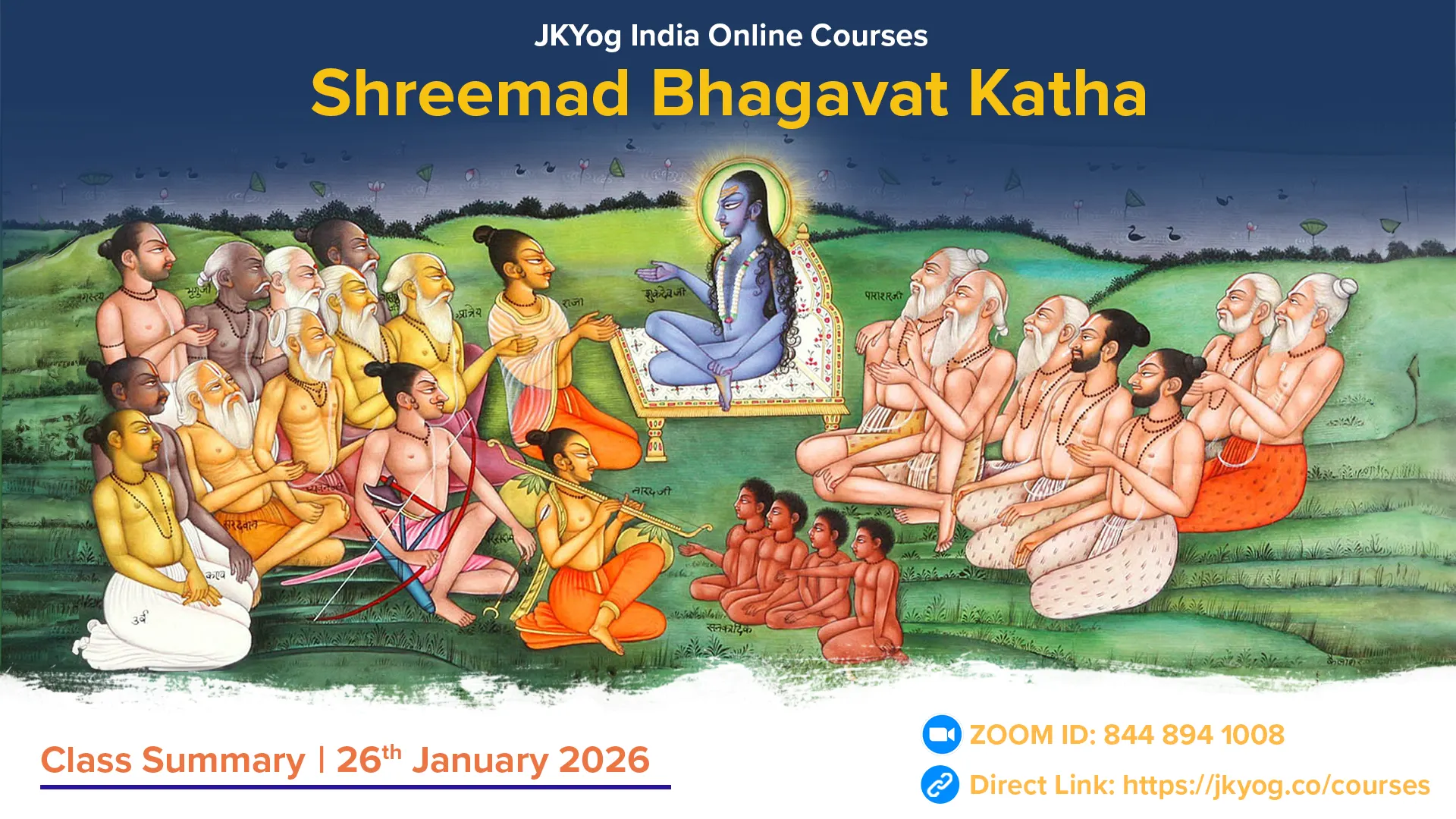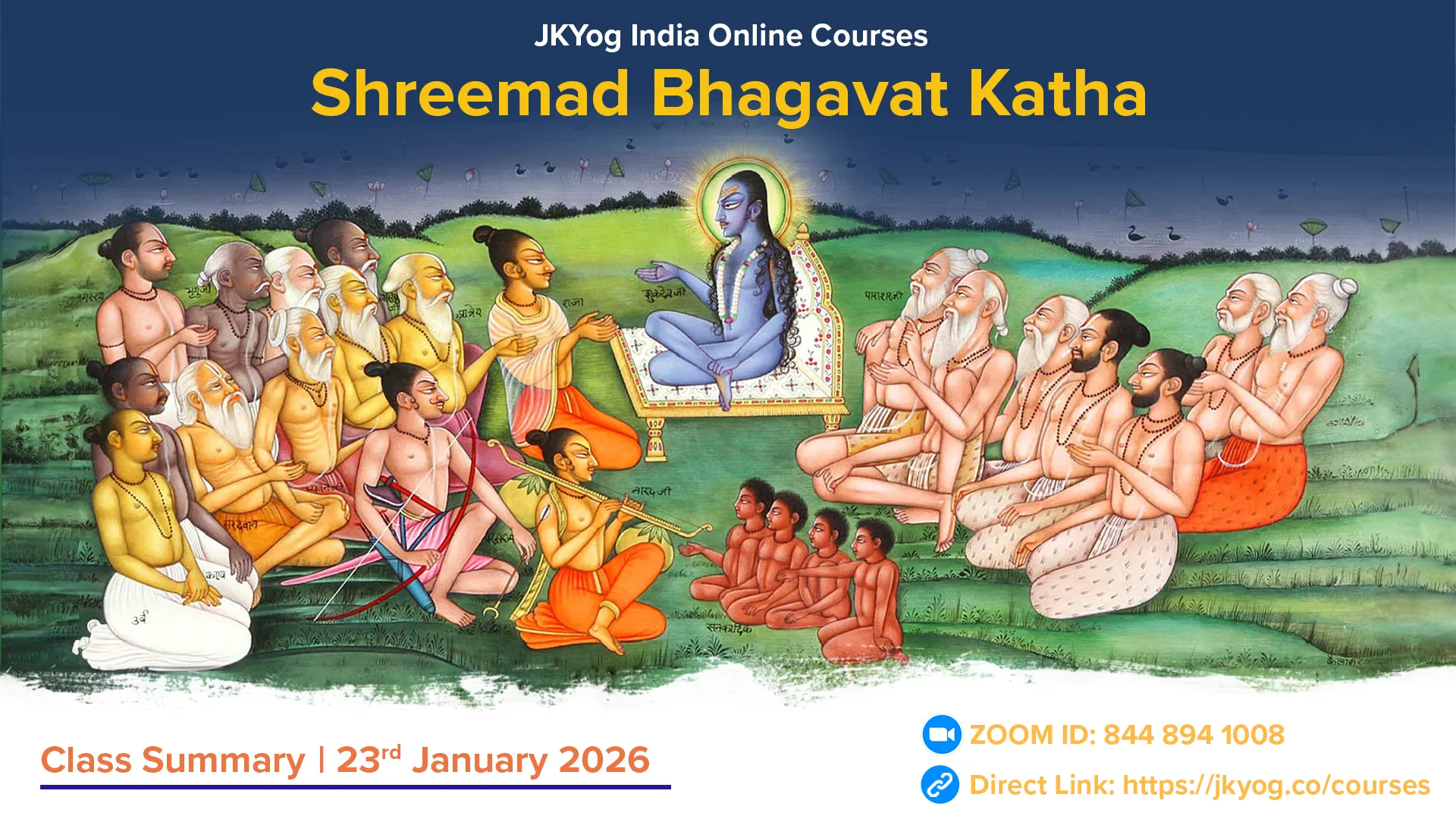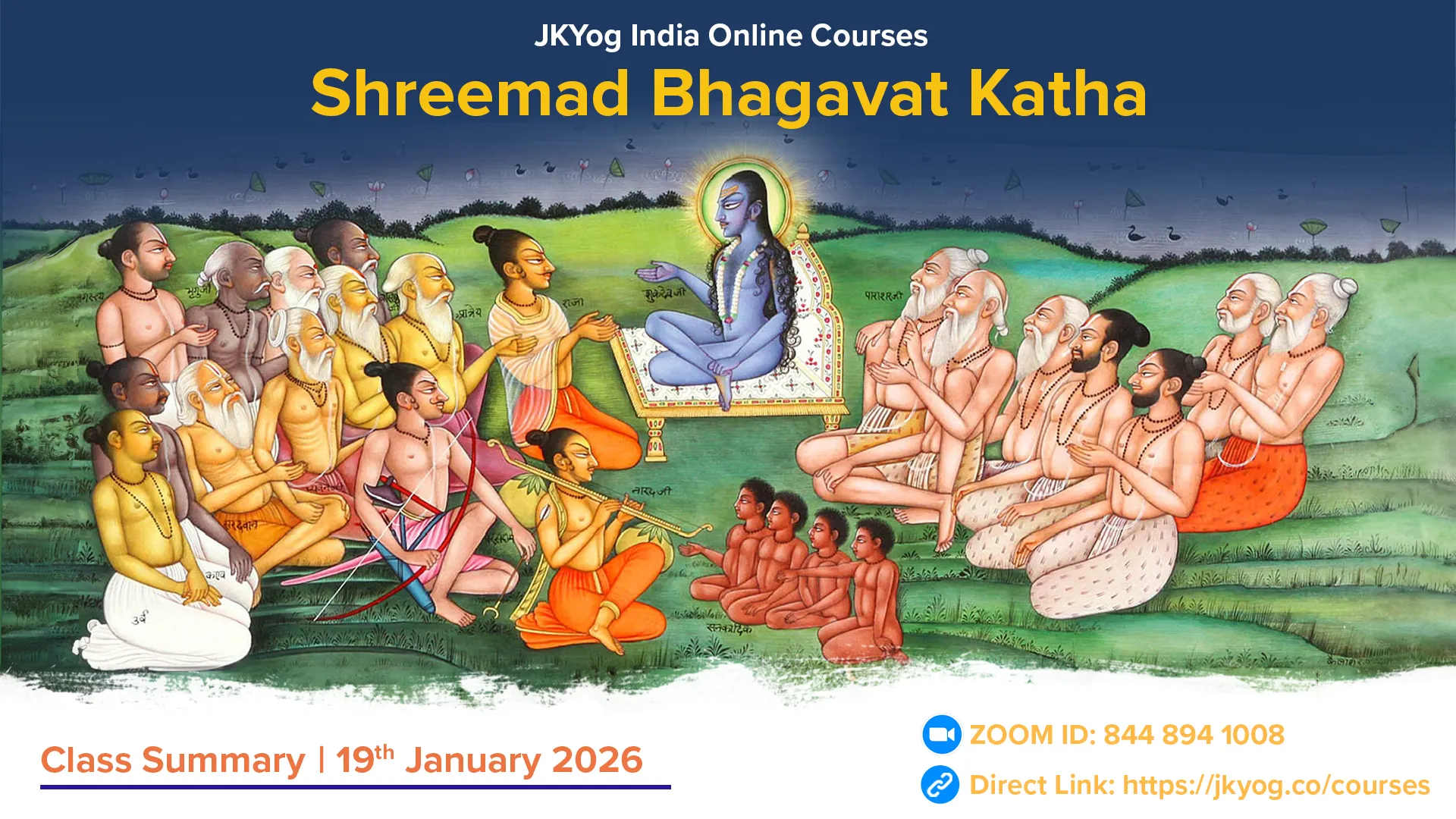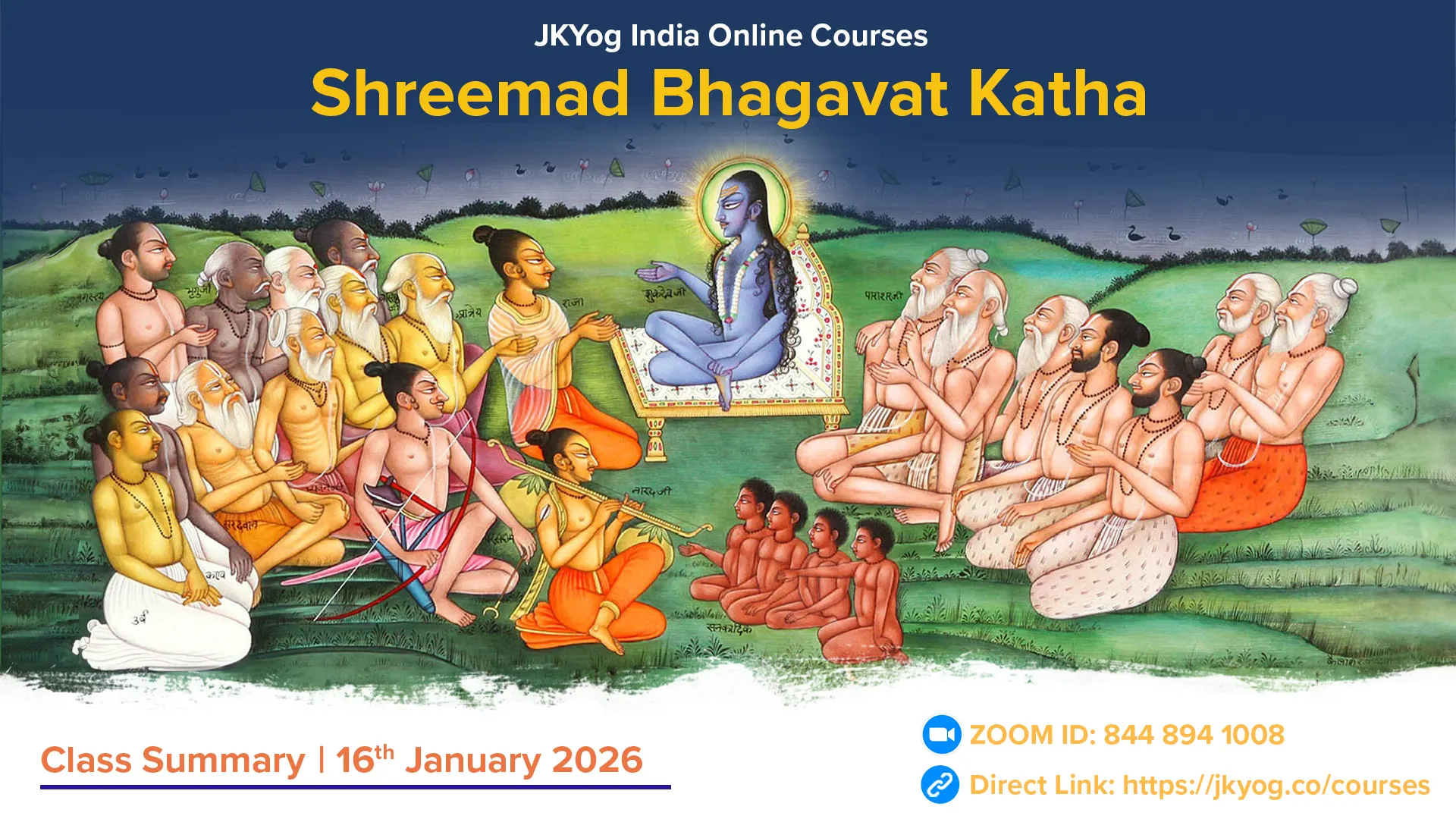Shreemad Bhagavat Mahapuran- Canto: 4, Chapters: 29-31
In ancient times, King Puranjan, leaving behind his friend Avignyat, roamed the Earth in search of a suitable place to settle. Driven by his craving for pleasures, he found no place that felt right. Eventually, he stumbled upon a magnificent city with nine gates located south of the Himalayas, which was as splendidly adorned as heaven itself. There, he encountered a beautiful young woman named Puranjani, who lived with ten companions, many female friends, and a five-headed serpent.
King Puranjan married her and spent a hundred joyful years in the city, immersed in indulgence and pleasure. He travelled in various directions through the city's nine gates. One day, dressed in golden armour, with a bow and quiver, and accompanied by his eleventh general, he ventured into the Panchprastha forest for a hunt. Riding a golden chariot drawn by five horses, they proudly hunted innocent animals.
As time passed, the king became so consumed by his wife's habits that his discernment began to fade. Meanwhile, with his army, the Gandharv king, Chandaveg, launched an attack on the city. The king's protector, the five-headed serpent, fought valiantly but slowly grew weaker. In the end, the daughter of kaal (death), 'Jara', and the Yavan king captured the city. Witnessing the city's downfall, the king fell into deep sorrow and helplessness. Ultimately, under the rule of the Yavan king, King Puranjan met his death.
Symbols and Their Meaning in the Puranjan Story
- Puranjan (Creator of the City): This symbolises the soul, which creates various types of bodies for itself—such as those with one, two, three, or four limbs, or bodies without limbs.
- Avignyat (Friend): This represents God, who cannot be known through names, qualities, or actions.
- The City with Nine Gates (Human Body): The soul chooses the human body with nine gates—two hands and two feet—to experience both pleasure and pain.
- Puranjani (Intellect or Ignorance): This represents ignorance, which generates the sense of "I" and "mine" in the body and the senses.
- Puranjani's Friends (Ten Senses): These are the soul's sense organs and action organs, which assist it in acquiring knowledge and performing actions.
- Five-Headed Serpent (Prana): The five types of prana (vital life forces)—prana, apana, vyana, udana, and samana—keep the body alive and active.
- Eleventh Warrior (Mind): The mind is the king of the senses, controlling their experiences.
- Nine Gates of the City (Body's Pathways):
- The five gates in the east: two eyes, two nostrils, and the mouth.
- The southern and northern gates: the right and left ears.
- The western gate: the anus and the genitals.
- Panchal Country (Five Objects of the Senses): Sound, form, smell, taste, and touch, which are experienced through the senses.
- Inner quarters of the palace (heart) and Vishuchi/ Chief Servant (mind): The heart is the centre of the body, where the mind (Vishuchi) resides. It is from here that emotions like joy and attachment arise.
- Chariot (Body):
- The five knowledge organs: the horses of the chariot.
- Virtue and sin: the wheels of the chariot.
- The three gunas (modes of nature): the flag of the chariot.
- The five pranas: the reins of the chariot.
- The mind: the charioteer.
- The intellect: the guide of the chariot.
- The heart: the seat in the chariot.
- Pleasure and pain: the shafts of the chariot.
- Chandaveg (Time): Symbolising time, whose 360 days and 360 nights reduce the human lifespan.
- Kaalkanya (Old Age): A stage of life that is unwelcome by all but which the Yavanaraj (Death) considers his sister.
- Adhi-Vyadhi (Mental and Physical Distress): These are the soldiers of death.
- Prajwar (Cold and Heat Fever): The fever of cold and heat, which quickly brings death.
- Three Types of Distress and Egoism:
- Adhibhoutik: Physical suffering.
- Adhyatmik: Mental suffering.
- Adhidaivik: Natural suffering.
The soul, covered in ignorance, experiences these sufferings due to its egoistic attachment to the body.
The Nature of the Soul and the Impact of Ignorance
Naradji explains the essence of the Puranjan story to Prachinbarhi, emphasising that the soul is pure, unchanging, and luminous by nature. However, under the influence of ignorance and the qualities of prakriti (maya), it adopts the feelings of "I" and "mine," becoming entangled in actions. Until the soul recognises God, it remains trapped in maya and continues to take birth in various forms of existence.
- Sattvic actions lead the soul to luminous realms, akin to heaven.
- Rajasic actions direct it toward sorrowful worlds.
- Tamasic actions result in the birth in ignorant and lowly life forms.
In this way, depending on its actions and qualities, the soul is born sometimes as a celestial being, sometimes as a human, and sometimes as an animal or bird. Just as a hungry dog wanders from place to place, sometimes beaten and sometimes fed, depending on its fate, the soul roams between higher, lower, and middle realms, carrying numerous desires in its mind and experiencing joy and sorrow as per its karma. This cycle continues until the soul realises the true nature of God and connects with Him.
Naradji teaches Prachinbarhi that the three types of suffering—Adhidaivik (sufferings due to natural calamities), Adhibhoutik (sufferings caused by other beings), and Adhyatmik (sufferings arising within oneself)—cannot be completely eradicated. Even if relief seems possible, it is temporary, like shifting a heavy load from the head to the shoulders. As one suffering ends, another appears, obstructing peace in life.
This cycle of action and its consequences arises from avidya (ignorance). Liberation from the fruits of karma is possible only through self-realisation. Ignorance keeps the soul trapped in the cycle of birth and death. The remedy for this ignorance lies in steadfast devotion to Shree Hari.
Vasudeve Bhagavati bhakti-yogah samahitah,
Sadhrichinena vairagyam jnanam cha janayishyati.
When devotion to Bhagwan Vasudev is established with focus, it naturally gives rise to true detachment and wisdom. (Bhagavat 4.29.37)
Devotees who listen to Bhagavad Katha transcend worldly obstacles and experience divine bliss. The soul is naturally surrounded by challenges such as hunger, thirst, attachment, and sorrow, yet it often fails to take an interest in Shree Hari's Katha and devotion. Even the sages and ascetics who engage in penance, worship, and meditation to attain the vision and knowledge of Brahman struggle to fully comprehend His divine nature.
Yada yasya anugrhnati Bhagwan atma-bhavitah,
Sa jahati matim loke vede cha parinishthitam.
When Bhagwan, with His grace, bestows His blessings on someone who is devoted to Him, that person abandons their attachment to worldly affairs and even to the strict observance of scriptural rituals. (Bhagavat 4.29.46)
Naradji explains to the king that he should not consider these actions as truly spiritual or selfless. These deeds may seem appealing but lack genuine spiritual purpose; they are rooted only in ignorance. Those who interpret the Vedas solely as a guide to rituals fail to grasp their true essence, as they are unaware of their own divine nature, where Bhagwan Shree Janardan resides. Those who once took pride in excessive actions, such as slaughtering animals, lacked the proper understanding of karma and its true significance. Haritosham yat sa vidya tanmatirya ya-In truth, the right action is that which pleases Bhagwan Shree Hari, and the true knowledge is that which leads the mind to be absorbed in Him.
Harir dehabhritam atma svayam prakritir ishvarah,
Tat padamulam sharanam yatah kshemom nrinaam iha.
The Supreme Bhagwan, who is the self of all beings and the ruler of nature, is the refuge and the ultimate source of safety for all humans. By surrendering to His lotus feet, one attains true well-being in this life. (Bhagavat 4.29.50)
Sa vai priyatamashchaatma yato na bhayam anvapi,
Iti Veda sa vai vidwan yo vidwan sa gurur harih.
He is the dearest self, from whom no fear arises. This is what the Vedas state: the one who knows this, is truly wise, and such a wise person is a Guru, and that Guru is Bhagwan Hari. (Bhagavat 4.29.51)
Shree Naradji says, "O noble king! Everything discussed so far has answered your question. Now, I will reveal a well-established and secret wisdom through metaphor. Listen carefully—"
Kshudram charam sumanasam sharaney mithitva raktam shadanghriganasam asu lubdhakarnam,
agre vrikaan asutrapo'viganyya yantam pashche mrigan mriga lubdhakabaana bhinnam.
"A deer is happily roaming in the flower garden with its doe, grazing on small shoots like grass and other tender sprouts. Its ears are attuned to the sweet humming of the bees. Right in front of it, wolves, who sustain themselves by killing other creatures, are lying in ambush, and from behind, a hunter has released an arrow to pierce it. However, the deer is so oblivious that it is unaware of any of these dangers." (Bhagavad 4.29.53)
Naradji says, "Reflect upon the condition of this deer and understand the meaning of this allegory. This dying deer represents you; consider your own state. Like flowers, women are pleasing only to the eyes, and their dwelling is akin to a garden of blossoms. Residing in it, you seek insignificant pleasures, like the nectar and fragrance of flowers—trivial sensual enjoyments such as food that pleases the tongue and union with women. Surrounded by women, you have entrapped your mind in them. The sweet speech of women and children is like the humming of bees, to which your ears are deeply attached.
Meanwhile, time, represented by the pack of wolves, is stealthily devouring your lifespan, day and night, but you remain heedless, intoxicated by household comforts. Behind you, the hunter, kaal (death), silently stalks, aiming to pierce your heart from afar with his concealed arrows.
Devarshi Naradji, while imparting self-knowledge to King Prachinbarhi, explained that the results of karma persist even after the destruction of the physical body, as the subtle body carries the impressions and outcomes of those actions. The king, having harboured doubts about karma from previous teachings, was enlightened by Naradji, who clarified that karma is not confined to the physical realm but is deeply rooted in the impressions from past lives and the tendencies of the mind. Naradji emphasised that when a person is entangled in sensory pleasures, they are bound by the chains of karma.
Ultimately, if one engages in devotional worship of Bhagwan Shree Hari and focuses their mind on Him, they can break free from these bonds. Naradji advised the king to dedicate his mind to the worship and remembrance of Shree Hari to transcend the sorrows of the material world.
The Tale of the Prachetas
Shree Maitreyaji narrated to Vidurji, "Narad Ji enlightened King Prachinbarhi about the true nature of the soul and the Supreme Being and then departed for Siddhalok. The king entrusted the responsibilities of ruling his kingdom to his sons and retired to Kapilashram to perform penance. There, renouncing all desires, he meditated on the lotus feet of Shree Hari and attained the position of Saroopya Mukti (oneness in form with Bhagwan).
Vidurji asked, 'Brahman! You mentioned King Prachinbarhi's sons earlier. By reciting the Rudra Geet to praise Shree Hari, what spiritual accomplishments did they achieve?' Shree Maitreyaji replied, "The Prachetas performed penance by chanting the Rudra Geet as a yajna while standing in the ocean. After ten thousand years of penance, the eternal Bhagwan Shree Narayan appeared before them. Shree Narayan said, 'You have dutifully followed your father's command, which will spread your glorious reputation across all realms. A famous son will be born to you, who will possess virtues comparable to Brahmaji. Through his progeny, the three worlds will flourish.
Bhagwan Narayan narrated the story of Kandu Rishi to them, explaining that an apsara named Pramlocha, sent by Indra to disrupt Rishi's penance, gave birth to a daughter. She abandoned her child and returned to Swarg. The trees nurtured the infant, and when she cried out in hunger, the king of herbs, Chandra, compassionately fed her with the nectar from his index finger. Your father is engaged in my service and has instructed you to propagate offspring. Therefore, you should marry this divine maiden. She shares the same Dharma and disposition as you, so she will be the wife of all of you and will love each of you equally. By my grace, you will enjoy immense strength and partake in earthly and divine pleasures for ten lakh celestial years. Eventually, through unwavering devotion to me, the impurities of your heart will be eradicated, and you will transcend the miseries of both this world and the next, attaining my supreme abode.'
Upon witnessing Bhagwan Narayan, the Prachetas were purified of rajas (passion) and tamas (ignorance). They offered heartfelt prayers to Shree Hari. Afterwards, emerging from the ocean, they observed that tall trees had overrun the Earth, blocking the path to Swarg. Angered, they unleashed mighty winds and flames, intending to destroy the trees, much like the fire of dissolution. Observing this, Brahmaji intervened, calming them and advising restraint. The frightened trees, under Brahmaji's guidance, presented a maiden named Marisha to the Prachetas. They married her, and through this union, Daksh was born. Daksh, a former son of Brahmaji, had previously relinquished his body due to his disregard for Bhagwan Mahadev. In the Chakshusha Manvantar, inspired by God, Daksh took up the task of creating new life forms. His exceptional skill in this task earned him the name 'Daksh'. Brahmaji appointed him as the leader of the Prajapatis, entrusting figures like Marichi with the responsibility of preserving creation.
Shree Maitreyaji concluded, 'After ten lakh years, the Prachetas recalled Bhagwan's teachings. Leaving their wife Marisha and their son Daksh behind, they retreated to the seashore. There, at the site where Jajali Muni attained perfection, they immersed themselves in deep meditation and contemplation of the Supreme. In this state, Shree Naradji appeared before them. The Prachetas confessed that they had forgotten the spiritual guidance provided by Bhagwan Shankar and Shree Vishnu due to the distractions of household life. They requested Naradji to reignite the supreme knowledge in their hearts so they could easily cross the ocean of material existence.'
Naradji's Teachings to the Prachetas
Naradji, while imparting wisdom to the Prachetas, said that only those actions, births, and lives are truly fruitful which are dedicated to the service of Shree Hari. Without attaining Him, all other efforts—be it penance, scriptural knowledge, or longevity—prove futile. Shree Hari is the source of all auspiciousness, and His worship is the highest form of devotion. This entire creation originates from Shree Hari and eventually merges back into Him.
Naradji explained that devotees who engage in sincere and selfless devotion to Shree Hari attain a purified heart and receive His infinite grace. Shree Hari holds immense love for His devotees, especially those who are free from material attachments and are entirely dedicated to their devotion. He accepts the worship of those devotees who are devoid of ego and discrimination. Naradji gave the Prachetas profound teachings along with the path to attaining liberation and then departed for Brahmalok. The Prachetas, deeply inspired by the divine instructions, immersed themselves in listening to the glorious deeds of Bhagwan and meditating upon His lotus feet. Eventually, they attained Shree Hari's supreme abode.
Shree Shukdevji told Parikshit that upon hearing this sacred and devotion-filled story narrated by Shree Maitreya, Vidurji was overwhelmed with love. Tears of devotion streamed from his eyes, and he remembered Bhagwan's feet while placing his head at the feet of the sage Maitreya. Vidurji said, "O great yogi! You are truly compassionate. Today, you have taken me beyond the darkness of ignorance to the realm where Shree Hari, the ultimate refuge of the humble, resides."
Shukdevji continued, "After offering his gratitude and prostrations to Maitreya, Vidurji sought his permission and, with a tranquil heart, departed for Hastinapur to reunite with his family."
Summary: JKYog India Online Class- Shreemad Bhagavat Katha [Hindi]- 16.12.2024

